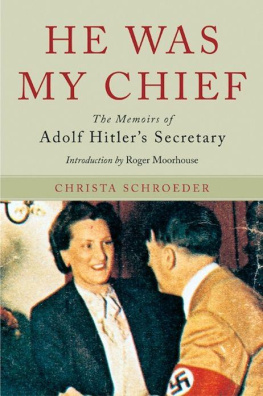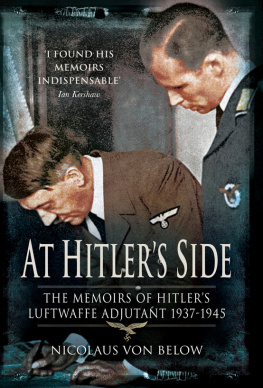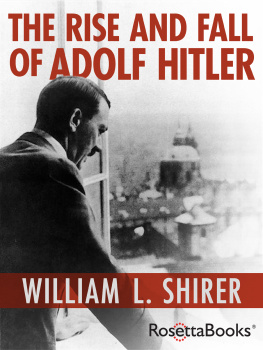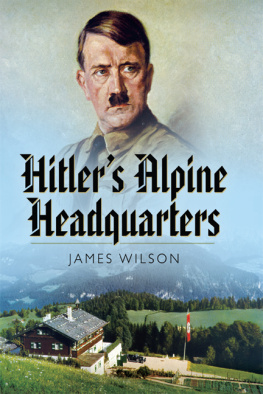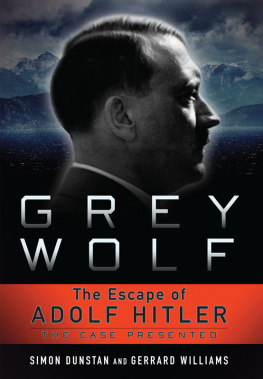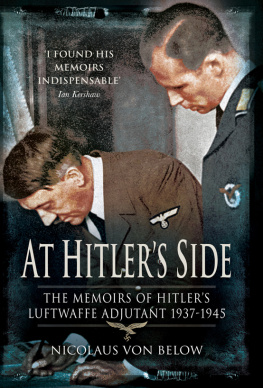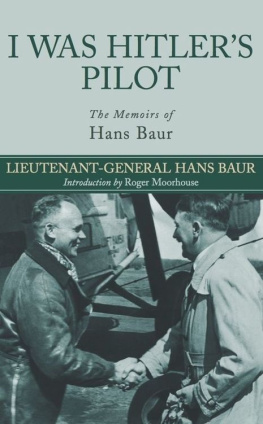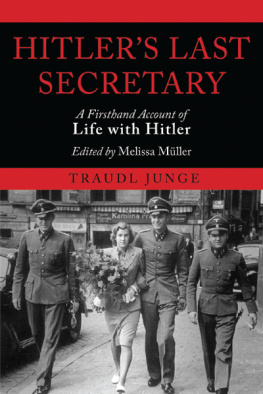Christa Schroeder - He Was My Chief: The Memoirs of Adolf Hitler's Secretary
Here you can read online Christa Schroeder - He Was My Chief: The Memoirs of Adolf Hitler's Secretary full text of the book (entire story) in english for free. Download pdf and epub, get meaning, cover and reviews about this ebook. City: Barnsley, year: 2012, publisher: Frontline Books, genre: Science / Non-fiction. Description of the work, (preface) as well as reviews are available. Best literature library LitArk.com created for fans of good reading and offers a wide selection of genres:
Romance novel
Science fiction
Adventure
Detective
Science
History
Home and family
Prose
Art
Politics
Computer
Non-fiction
Religion
Business
Children
Humor
Choose a favorite category and find really read worthwhile books. Enjoy immersion in the world of imagination, feel the emotions of the characters or learn something new for yourself, make an fascinating discovery.
- Book:He Was My Chief: The Memoirs of Adolf Hitler's Secretary
- Author:
- Publisher:Frontline Books
- Genre:
- Year:2012
- City:Barnsley
- ISBN:978-1-7830-3064-4
- Rating:4 / 5
- Favourites:Add to favourites
- Your mark:
- 80
- 1
- 2
- 3
- 4
- 5
He Was My Chief: The Memoirs of Adolf Hitler's Secretary: summary, description and annotation
We offer to read an annotation, description, summary or preface (depends on what the author of the book "He Was My Chief: The Memoirs of Adolf Hitler's Secretary" wrote himself). If you haven't found the necessary information about the book — write in the comments, we will try to find it.
He Was My Chief: The Memoirs of Adolf Hitler's Secretary — read online for free the complete book (whole text) full work
Below is the text of the book, divided by pages. System saving the place of the last page read, allows you to conveniently read the book "He Was My Chief: The Memoirs of Adolf Hitler's Secretary" online for free, without having to search again every time where you left off. Put a bookmark, and you can go to the page where you finished reading at any time.
Font size:
Interval:
Bookmark:
Christa Schroeder
HE WAS MY CHIEF
THE MEMOIRS OF ADOLF HITLERS SECRETARY

Introduction
CHRISTA SCHROEDER WAS AN ordinary woman cast into quite extraordinary times. Born in 1908 in the pretty central German town of Hannoversch Mnden, she trained as a stenotypist before moving to Munich in 1930. Whilst there, she replied to an advertisement in the newspaper for a secretarial position at the headquarters of Hitlers stormtroopers the SA. The association thus forged would be a lasting one. Graduating to a position as Hitlers personal secretary in 1933, Schroeder would be part of the Fhrers entourage for the following twelve years, right up the bitter end in 1945.
This memoir, compiled from contemporary notes and letters as well as postwar reminiscences, is Christa Schroeders own record of those extraordinary times. It gives the reader a fascinating insiders viewpoint on many of the salient events of the Third Reich. She expounds not only on political developments such as the Rhm Purge of 1934 or the attempt on Hitlers life in July 1944, but also on military matters from the Polish campaign through to the final collapse of the Nazi regime, which she experienced from the comparative safety of Berchtesgaden.
Yet it is not primarily for her political insights that Schroeder is of interest. Her experiences certainly ranged widely, but there is a backbone to her book which is not concerned with grand politics a subject about which she claimed to have little knowledge or understanding rather it gives an intimate view of the workings of Hitlers household and of the various characters working therein. In this regard, there is a refreshingly gossipy, chatty flavour to the book, as it illuminates some of the foibles and idiosyncrasies of members of Hitlers entourage, as well as addressing more substantial themes such as Hitlers often difficult and mysterious relationships with women.
Hitler looms large in the book, of course. As secretary to the Fhrer throughout the Third Reich, Schroeder knew Hitler as well as anyone and was extremely well placed to comment on his behaviour and personality. Indeed, Schroeder was herself no shrinking violet, and often spoke rather too bluntly to her employer. In the winter of 1944, for instance, she asked Hitler to his face if he still believed that the war could be won. Indeed, it seems that her candour almost became her undoing when she was ostracised by Hitler for a number of months after making the mistake of publicly contradicting him once too often. Yet, for all that, Schroeders is nonetheless a not unaffectionate portrait. Indeed, her presentation of the leader of the Third Reich as a rounded, three-dimensional, human being with likes and dislikes, hopes and fears is fascinating. She details his bourgeois manners, his vehement abstemiousness, his mood swings, even his sense of humour. Her description of Hitler is not of the wide-eyed fanatic, so familiar to the modern reader; rather he appears as a generous even avuncular benefactor, a kisser of ladies hands; a man who chatted easily with his secretaries and had a passion for Bavarian apple cake.
For all its gossipy revelations, however, there is a dark side to Schroeders story. For one thing, the tone of her book is utterly unapologetic; there is nothing, for example, of the sense of perspective or mea culpa that one finds in the memoirs of Hitlers other secretary, Traudl Junge who famously concluded that we should have known about the horrors of the Third Reich. This lack of remorse is, in part, a consequence of Schroeders rather cantankerous character: even the editor of this volume, Anton Joachimsthaler, described her as tough, extremely critical and even wounding in her ways.
Yet there is more to it than that. Schroeder claimed convincingly, I think to have known nothing of the horrors of the Nazi regime and of the crimes being committed in Germanys name. One might legitimately ask how a secretary in the Reich Chancellery could have long remained ignorant of the Holocaust. Yet, for all her closeness to the epicentre of power in Hitlers Germany, Schroeder would have argued that hers was a rather mechanical task largely restricted to the typing up of speeches and mundane daily correspondence, in which such events were rarely mentioned, or else couched in an impenetrable fog of euphemisms and double-speak. The most sensitive of instructions, of course, would always have been transmitted in person, thereby leaving little or no paper trail. Moreover, Schroeder was if anything too close to Hitler and the Nazi elite too close to gain an objective view, too close to question the propaganda, too close perhaps to catch a glimpse of the ugly truth. Confined in the rarefied atmosphere of Hitlers court in the eye of the Nazi storm Schroeder was effectively insulated from the grim realities of the world outside.
As the logical corollary to this ignorance, Schroeder found it difficult to imagine that she personally had done anything reprehensible. Nonetheless, classified by the Americans as a war criminal of the first order, she was interned for three years after 1945. This treatment evidently rankled. As she complains in this book: Whether my guilt was as great as my expiation is something I do not know to this day.
There were further grounds for her bitterness. After the war, she was interrogated at length by Frenchman Albert Zoller, who was serving as a liaison officer with the US Seventh Army. Zoller typed up and embellished his interrogation notes and published them under his own name as Hitler Privat, in 1949, describing the work as the memoir of Hitlers secret secretary, but with Schroeder receiving no credit and, of course, no royalty. She would later complain that Zoller had also taken many of the material mementoes Hitlers sketches etc. that she had been given or had rescued from the ruins of the Third Reich. But, what rankled most perhaps, was that she claimed that he had also appended her name to various comments, opinions and anecdotes that she had never given.
Christa Schroeders memoir was published, in German, soon after her death, aged seventy-six, in 1985. Understandably perhaps, given the injustice that she clearly felt, the book had a hint of obsession about it. She waxed bitterly lyrical about Zollers perfidy, and appended lists of errors and statements that, she said, had been falsely attributed to her. As a self-confessed fanatic for truth, it seems, she was desperate to set the record straight, to put an end to what she perceived as her exploitation and misrepresentation by a generation of historians and writers.
Despite being a critical and commercial success, however, Schroeders book did not find an English language edition until the present volume, over two decades later. This is peculiar; especially if one bears in mind the reception accorded to the memoir of Hitlers other secretary Traudl Junges Until the Final Hour which was published to great acclaim in 2002. It may have something to do with Schroeders rather prickly and unrepentant nature, and with the precise instructions that she left regarding how the memoir was to be prepared and published. It may also be that such personal testimony was simply out of favour in the mid 1980s. History, at that time, was at the height of its postmodernist spasm and was perhaps too busy finding obscure new perspectives and spurious grand narratives to bother too much with the simple memoirs of a simple secretary.
But there may be another reason why Schroeders memoir was overlooked by British publishers in the 1980s. Two years before its original publication, the world had been stunned by the grand hoax of The Hitler Diaries, supposedly discovered in the GDR, but quickly demonstrated to have been crude forgeries. In the process, of course, a number of historians, publishers and newspapers were embarrassed. And, in the aftermath, many of those same publishers recoiled when they were presented with any work that they considered to be even vaguely similar.
Font size:
Interval:
Bookmark:
Similar books «He Was My Chief: The Memoirs of Adolf Hitler's Secretary»
Look at similar books to He Was My Chief: The Memoirs of Adolf Hitler's Secretary. We have selected literature similar in name and meaning in the hope of providing readers with more options to find new, interesting, not yet read works.
Discussion, reviews of the book He Was My Chief: The Memoirs of Adolf Hitler's Secretary and just readers' own opinions. Leave your comments, write what you think about the work, its meaning or the main characters. Specify what exactly you liked and what you didn't like, and why you think so.


